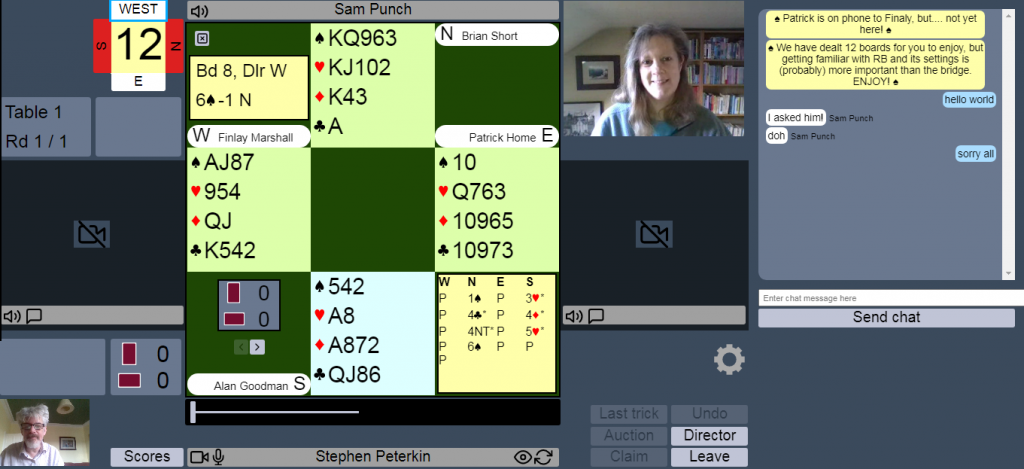Professor Samantha Punch, Professor of Sociology, Social Policy & Criminology, Faculty of Social Sciences, University of Stirling
Christina Ballinger, Mindsport Officer, BAMSA
Tim Rees, BAMSA steering group

When Covid-19 started causing major disruption to people’s lives in 2020, concerns about mental health, social isolation, loneliness and wellbeing have become more prevalent. Since then, government policy has been increasingly focused on tackling these critical social issues. One area of activity that can assist in achieving policy priorities is the card game bridge. Bridge (along with other activities such as chess) is a mindsport that has cognitive benefits for those who take part. Bridge has an additional advantage in that it is always played in partnership with four players at the table and is often a team activity, thereby offering social connection.
Bridge is a mindsport for all ages and genders, with players competing with and against each other on an equal basis. It has benefits for young people, teaching mathematical and logical techniques, and improving social skills such as empathy and cooperation. It is played by older people, helping to keep their minds active and combatting potential social isolation. At an elite level, it is played both by amateurs and professionals, with world championships contested by international teams including junior teams of players up to 25 years old. Families also play together, enhancing intergenerational connection and communication.
Bridge: A MindSport for All (BAMSA) is a charitable project based at the University of Stirling. It was formed to enable academics to carry out sociological research and to work collaboratively with bridge organisations. Led by Professor Samantha Punch, BAMSA has produced a number of research papers exploring the benefits of bridge from their Bridging Minds project. The first published paper, Performing Identity in the Mindsport Bridge, has had over 1700 views and downloads. The article demonstrates the value of the partnership element in bridge. Players learn to adapt to and to accommodate their partner, building effective communication and cooperation.
BAMSA’s second research paper shows how skills learned at the bridge table can be an advantage in other areas, including business, personal and social life. Transferable life skills include strategic planning, flexibility in problem-solving, concentration and focus. These are developed alongside interpersonal skills, resilience and emotional self-control. The Bridging Minds research illustrates not only the intellectual challenge of the partnership mindsport, but also the opportunities it offers for social and emotional development.
Prior to Covid-19, bridge was mainly a face-to-face activity, played in bridge clubs, community halls and people’s homes. During the various lockdowns, digital bridge has become more popular. Before 2020, the online bridge platforms were solely digital, with messages between participants being typed on-screen. Platforms, like ‘RealBridge’, are now available that incorporate video and audio communication, which provides further scope for participants to socialise.

One positive story from the pandemic in relation to bridge is that as bridge clubs closed around the world, the mindsport shifted online and the global bridge community supported many players to become digitally literate for the first time. BAMSA’s Covid Impacts on Bridge study shows that many 80-year-olds who had never used a computer before are now playing online bridge. Having now embraced new technologies in order to continue their hobby, this has enabled them to be more socially connected with family and friends during lockdown. Many over-70s have described online bridge as a ‘lifesaver’ during the pandemic.
When Covid-19 restrictions are lifted, many players are looking forward to returning to face-to-face bridge, to increase their social interaction and to combat loneliness. However, the new online facilities will still be available, allowing players with reduced mobility to stay engaged, thereby improving mental health outcomes. Another positive story is that online bridge is attractive for use in schools. A Scottish school in Inverness is leading the way with digital bridge. The staff have emphasised the development of new technological skills, communication skills and multi-tasking skills. The head teacher has commented that the concentration of the pupils is remarkable.
BAMSA is hosting the 4th International Bridge Conference, a four-day online event opening on Monday 28 June. More than 70 presenters and panellists from 20 countries are contributing to the programme. The keynote address, Bridge and Wellbeing, will be delivered by US Professor Martin Seligman, the founder of positive psychology, author of more than 30 books on learning and motivation, and a lifelong bridge player.
The conference is an open forum for academics, bridge players, organisers and policymakers from across the bridge spectrum (local, national and international). The aim is to provide a relaxed online environment in which to share ideas, review good practice and focus on solutions. A key goal is to promote bridge as a mindsport that offers social, health and cognitive benefits for players of all ages. Currently there have been more than 900 sign-ups across the eight conference sessions, and the attendees span over 30 countries.
The conference sessions will consider a variety of topics, including those touched on above: the benefits of mindsport (day 1) and the shift from face-to-face leisure to digital arenas (day 2). BAMSA’s research aligns with the University of Stirling’s Ageing Well research programme, with day 3 of the conference focussing on community, gender, ageing, and interaction between people of different ages and generations. The final day (day 4) will explore the new approaches to learning and teaching, including the growth of bridge and mindsport in schools. Theoretical sessions will provide insights into current academic thinking and conceptual frameworks for understanding bridge, including definitions of sport, mindsport and serious leisure.
The programme is varied in terms of format and participant engagement, balancing academic rigour with practical examples. The overall aim of the conference is to push the boundaries of current academic thinking and shape a future research agenda. A wide range of pre-recorded presentations are now available to view on the BAMSA website. Each day has its own theme which links to the ongoing research of Bridge: A MindSport for All:
Day 1, Monday 28 June: Bridge as a Mindsport
Day 2, Tuesday 29 June: Digital Bridge: Opportunities and Challenges
Day 3, Wednesday 30 June: Healthy Ageing, Intergenerationality and Gender
Day 4, Thursday 1 July: Education, Learning and Development
For more information or to register for free for any of the sessions: https://bridgemindsport.org/bridging-academia-policy-practice-conference/
If you have never played bridge but are curious to try it out, join the taster session for first timers at the conference:
https://bridgemindsport.org/conference-day-3-bridge-taster/
